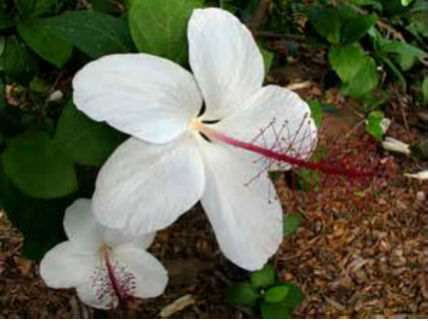Mistaking Hibiscus for Marijuana, DEA Raids Gardener's Home

Last month I noted that a visit to an indoor gardening store plus wet tea leaves in your trash can earn you an early-morning visit by rifle-wielding agents of the state. In addition to drinking tea, a fondness for hibiscus (perhaps to put in your tea) can make you look like a felon to cops with too much time on their hands, as Angela Kirking discovered last fall. Four DEA agents and five local police officers burst into Kirking's Sherwood, Illinois, home around 5 a.m. on October 11, looking for a marijuana grow. Instead they found 9.3 grams of pot (less than a third of an ounce) and three glass pipes. Kirking, a 46-year-old face painter, recently asked a judge to throw out the evidence obtained during the search and the two misdemeanor charges resulting from it, arguing that police did not have probable cause for a warrant.
Why did the DEA think Kirking was growing pot? On September 17, The Huffington Post reports, Donn Kaminski, a Braidwood, Illinois, police officer assigned to the DEA, was staking out Midwest Hydroganics in Crest Hill when he observed Kirking "exit the front door of the store carrying a green plastic bag containing unknown items." Kirking says it was liquid fertilizer for her hibiscus plants. Based on her apparent interest in gardening, Kaminski obtained Kirking's electric bills, which were "consistently higher" than the bills of two neighbors. He also sifted through her garbage, finding "multiple green plant stems" that allegedly smelled like "green cannabis." A field test (perhaps the same kind that misidentified Addie Harte's tea leaves as marijuana) supposedly confirmed that the stems came from a cannabis plant. Presto: probable cause. Or so a judge thought.
Another judge may decide differently. During a hearing earlier this month, Patch reports, Will County Judge Bennett Braun seemed unimpressed by Kaminski's electric-bill analysis, saying "ComEd routinely notifies him that his electric bills are higher than average." The DEA's formula for probable cause in this case mixed two completely innocent facts—a fertilizer purchase and relatively high electric bill—with an agent's odor report and a field test, both of which are notoriously unreliable and both of which proved inaccurate with respect to Kirking. The DEA spent nearly a month investigating Kirking, but somehow it could not spare the time for a lab test on her plant stems before charging into her house.
Beyond the lack of diligence in this particular case is the standard outrage of pot prohibition, which leads employees of our government to spy on the customers of hydroponic supply stores and rummage through their trash, looking for traces of arbitrarily proscribed plants. Grown men should be embarrassed that they do not have better things to do with their time.


Show Comments (51)